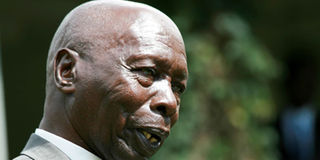Return of Moi Day dogged by 31 years of controversy

Former President Daniel arap Moi. Former Director of Presidential Press Service Lee Njiru says Moi has been marking the day quietly ever since he retired in January 2003. PHOTO | FILE | NATION MEDIA GROUP
What you need to know:
- MP for Taveta Norman Nthenge Lukind moved a motion seeking to set aside a holiday dedicated to Kenya's second president, Daniel arap Moi.
- In a lengthy speech to a hushed House, Mr Nthenge pleaded with MPs to pass the motion.
He described Mr Moi as having “dedicated his entire life” to serving Kenya.
Legislators who were opposed to it gagged themselves.
Reinstatement of Moi Day as a public holiday by a High Court judge rekindles memories of its three decades in which it was steeped in controversy.
The initial legislation, which took three years to be completed, was controversial too as members of Parliament were quietly split.
It was on a Wednesday morning on April 29, 1987. Little-known MP for Taveta Norman Nthenge Lukindo walked into Parliament to move a motion seeking to set aside a holiday dedicated to Kenya's second president, Daniel arap Moi.
KENYATTA'S FOOTSTEPS
Legislators who were opposed to it gagged themselves.
That morning, Deputy Speaker Samwel arap Ng’eny (Aldai) guided the debate cognisant of the fact that Kenya was under a single party rule.
Total loyalty to Kanu was the thermometer for leadership and anything to the contrary led to expulsion from Kanu.
In a lengthy speech to a hushed House, Mr Nthenge pleaded with MPs to pass the motion. He described Mr Moi as having “dedicated his entire life” to serving Kenya.
“In his ninth year as President, he has religiously followed founding father Mzee Jomo Kenyatta’s nyayo (footsteps).”
HURRIEDLY PASSED
The rest was a chorus to pass the motion. Legislators in the 188-member House hailed Mr Lukindo as a patriotic MP who wanted to leave a legacy.
Mr James Mbori (Kasipul-Kabondo), to whom Mr Lukindo surrendered his three minutes of reply, declared Moi a “God-given leader” who deserved to be honoured.
But Mr Martin Shikuku (Butere) raised issue with the way the motion was being hurriedly passed without a government responder.
The chair ruled that an assistant minister in the Office of the President, Mr Isaac Salat, who had contributed to the debate (in his individual capacity), was a bona fide State responder.
In his contribution, Mr Salat had suggested that a combined Kanu and MPs committee be set up to decide on the actual date for the holiday.
UNANIMOUSLY PASSED
One option would have been Mr Moi’s birthday — September 2, 1924 — or October 10, 1978, the day he was elected unopposed as the second President.
Subsequent speakers backed the October date, even citing the “Daily Nation” four-word headline — Moi is the Man!
The significance of that date was that it was exactly 49 days after Mzee’s death on August 22, 1978.
It was also 41 days before the 90-day deadline for an acting President stipulated in the former Constitution.
The MPs who backed the date argued that it was embedded in the country’s history, rather than a birthday, which is usually personal. It was unanimously passed.
BAD PRECEDENT
However, some MPs who feared to go on “Hansard” record as having opposed it, including the fiery Shikuku, gathered in groups in the lobby speaking in whispers that it was a bad precedent.
Their complaint was that subsequent presidents may also want their public holidays.
Although the motion was passed in 1987, the first holiday was marked on October 10, 1989, due to the General Election (mlolongo) of 1988 and the fact that Parliament did not amend the Act until 1989.
The holiday was scrapped via a statement from Government Spokesman Alfred Mutua (now Machakos Governor) on October 10, 2010, who said the day would no longer be publicly celebrated in accordance with the new Constitution which recognised only nine holidays, including Christian and Muslim religious days.
PUBLIC HOLIDAYS ACT
In March last year, lawyer Gregory Nyauchi, who was a Standard Seven pupil in 1989, went before Justice George Odunga to argue a case for reinstatement of Moi Day.
For the next six months, the judge listened to the arguments.
Attorney-General Prof Githu Muigai opposed it on grounds that the Interior Cabinet Secretary was given leeway under law to gazette any other holiday by any other name.
He presented the court with holidays recognised by the Constitution.
Mr Nyauchi, on his part, argued that although the Constitution spelt out those holidays, the Public Holidays Act had not been amended to align it with the Constitution and still recognises Moi Day.
HELP DISADVANTAGED
In his judgment, delivered on November 8, 2017, Justice Odunga was convinced by Mr Nyauchi that it was an “illegality” not to celebrate Moi Day.
His orders were that unless Parliament amends the Act, it will remain a public holiday.
Former Director of Presidential Press Service Lee Njiru, when contacted, said Moi has been marking the day quietly ever since he retired in January 2003.
President Moi had indicated to Kenyans that he would like it to be a day of philanthropy by helping the disadvantaged.




